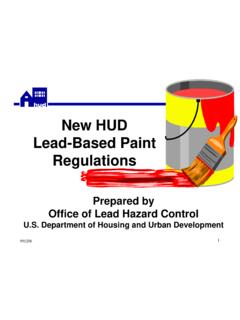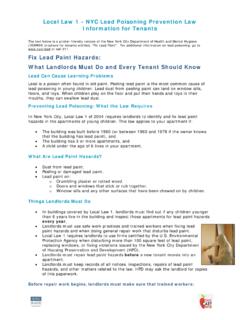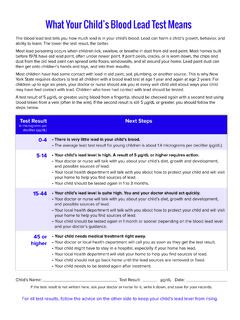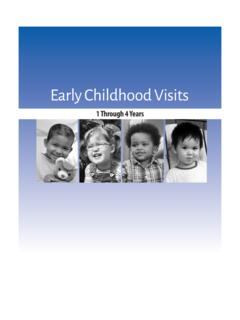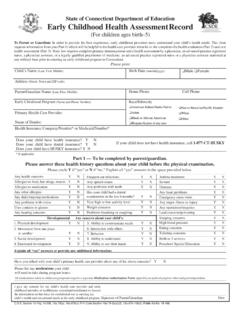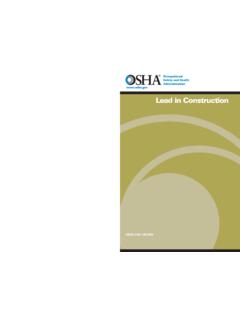Transcription of Early Childhood Experiences and Health - ed
1 To find out more on the integral relationship between our Health and how we live, learn, work and play, visit EXPLORING THE SOCIAL DETERMINANTS OF Health This issue brief, published in March 2011, is one in a series of 12 issue briefs on the social determinants of Health . The series began as a product of the Robert Wood Johnson Foundation Commission to Build a Healthier America. ISSUE BRIEF #2 Early Childhood Experiences and Health 1. Introduction The earliest years of our lives are crucial in many ways, including how they set us on paths leading toward or away from good Health . Family income, education, and neighborhood resources and other social and economic factors affect Health at every stage of life, but the effects on young children are particularly dramatic.
2 While all parents want the best for their children, not all parents have the same resources to help their children grow up healthy. Parents education and income levels can create or limit their opportunities to provide their children with nurturing and stimulating environments and to adopt healthy behaviors for their children to model. These opportunities and obstacles, along with their Health impacts, accumulate over time and can be transmitted across generations as children grow up and become parents themselves. As noted in an earlier Robert Wood Johnson Foundation report,1 a large body of evidence now ties Experiences in Early Childhood with Health throughout life, particularly in adulthood. Strong evidence also demonstrates that it is possible to turn vicious cycles into paths to Health , by intervening Early .
3 Although effects of Early Childhood interventions are greatest for children who are at greatest social and economic disadvantage, children in families of all socioeconomic levels experience benefits from Early Childhood programs that translate into improved development and Health . The earliest years of our lives set us on paths leading toward or away from good Health . page 2 2. How do social and economic conditions Early in life shape children s Health and development, thus shaping adult Health ? CHILDREN S SOCIAL AND ECONOMIC CONDITIONS HAVE DIRECT EFFECTS ON Health The association between socioeconomic factors and child Health is evident from birth, as children born to mothers with low income and educational levels are more likely to be premature or of low birth weight; these birth outcomes are strong predictors of infant survival and also of Health across the entire life course.
4 In addition, it is widely recognized that factors such as nutrition, housing quality, and household and community safety all linked with family resources are strongly linked with child Health . Research shows that children s nutrition varies with parents income and education and can have lasting effects on Health throughout life; for example, inadequate nutrition is linked with obesity during Childhood , which in turn is a strong predictor of adult obesity and its accompanying risks of chronic disease, disability and shortened life. Similarly, children exposed to lead-based paint, most commonly found in lower-income neighborhoods, are more likely to suffer from lead- poisoning that can lead to irreversible neurologic damage. SOCIAL AND ECONOMIC CONDITIONS ALSO AFFECT CHILDREN S DEVELOPMENT A large body of research also has shown that Experiences in Early Childhood affect children s brain, cognitive and behavioral development.
5 Scientific advances in recent decades have demonstrated how social Experiences in the first few years of life shape infants and toddlers development, creating physiological as well as behavioral foundations adverse or favorable for Health throughout life. Studies tracking children s development have documented environmental factors and interactions of parents and other caregivers with children while measuring cognitive, behavioral and physical development and in some cases physical Health ; some of these studies have followed children into adulthood. The results consistently link children s development Figure 1. A cycle of opportunity or obstacles. At every stage of our lives, social advantage or disadvantage is linked to Health . Social and Health advantage or disadvantage accumulates over time, creating favorable opportunities or daunting obstacles to Health .
6 Opportunities or obstacles play out across individuals lifetimes and across generations. Intervening Early in life can interrupt a vicious cycle, transforming it into a path to Health for all children and leading to a healthy and productive adult workforce. Improving Early Childhood social circumstances is one of the most effective ways for a society to achieve its Health potential. By kindergarten or even earlier, children in both lower-income and middle-class families are at a developmental dis-advantage compared with children in the most affluent families. page 3 with social and economic advantages and disadvantages in the home environments of young children. Neighborhood conditions such as safety, presence of parks and playgrounds, and access to fresh produce can have a significant impact as well.
7 Parents social and economic resources can affect the quality and stability of their relationships with their infants, and parent-infant relationships affect children s emotional development and the cognitive stimulation they receive. Maternal depression, which can inhibit mother-infant bonding, is more prevalent among low-income mothers than among those with higher Higher income and/or educational attainment among parents are associated with more stimulation of and response to infants and young children, which are directly linked to brain The effect of family socioeconomic circumstances on children s language development is evident as Early as 18 months; children in families of middle as well as low socioeconomic status are at a disadvantage compared with their better-off Results of the Early Childhood Longitudinal Study-Kindergarten Cohort (ECLS-K), a national sample of children entering kindergarten, showed that family income is associated with children having the academic and social skills necessary for kindergarten.
8 Compared to children in the highest-income families, children in the lowest-income families were least likely to have the needed skills, but children in middle-class families also performed less well, both socially and academically, than those at the The links between social and economic conditions and children s development may be explained in part by educational differences in parents awareness of Early Childhood developmental needs. Research also shows, however, that higher income generally means lower levels of chronic stress in the home, as well as greater resources to cope with stressors both of which enable parents to interact more often and more favorably with their children. Brain, cognitive and behavioral develop-ment Early in life are strongly linked to an array of important Health outcomes later in life, including cardiovascular disease and stroke, hyper-tension, diabetes, obesity, smoking, drug use and depression.
9 Page 4 CHILDREN S DEVELOPMENT SHAPES SOCIAL AND ECONOMIC WELL-BEING THROUGHOUT LIFE The first few years of life are crucial in establishing the path including the opportunities and obstacles along the way that a child will follow to social and economic well-being in adulthood. Particularly without intervention, the gaps in academic and cognitive skills that are apparent when children enter school generally do not close. In fact, these gaps can grow even larger as disadvantaged children progress more slowly than children from higher-income and better- educated families. ECLS-K study results showed that children at higher social risk had lower reading and math scores in kindergarten and also experienced smaller gains in both these areas by the end of third grade than children with fewer family risk Poor academic performance is linked to subsequently dropping out of high school, lower educational attainment, delinquency and unemployment later in life.
10 CHILDREN S DEVELOPMENT SHAPES Health THROUGHOUT LIFE How a child develops shapes his or her Health as an adult. A large body of research has consistently shown that brain, cognitive and behavioral development Early in life are strongly linked to an array of important Health outcomes later in life, including cardiovascular disease and stroke, hypertension, diabetes, obesity, smoking, drug use and depression conditions that account for a major portion of preventable morbidity and premature mortality in the United States. The links between children s development and adult Health may involve connecting the dots through effects on important social outcomes including educational attainment and/or on Health -related behaviors, but in some cases they may be more direct.










